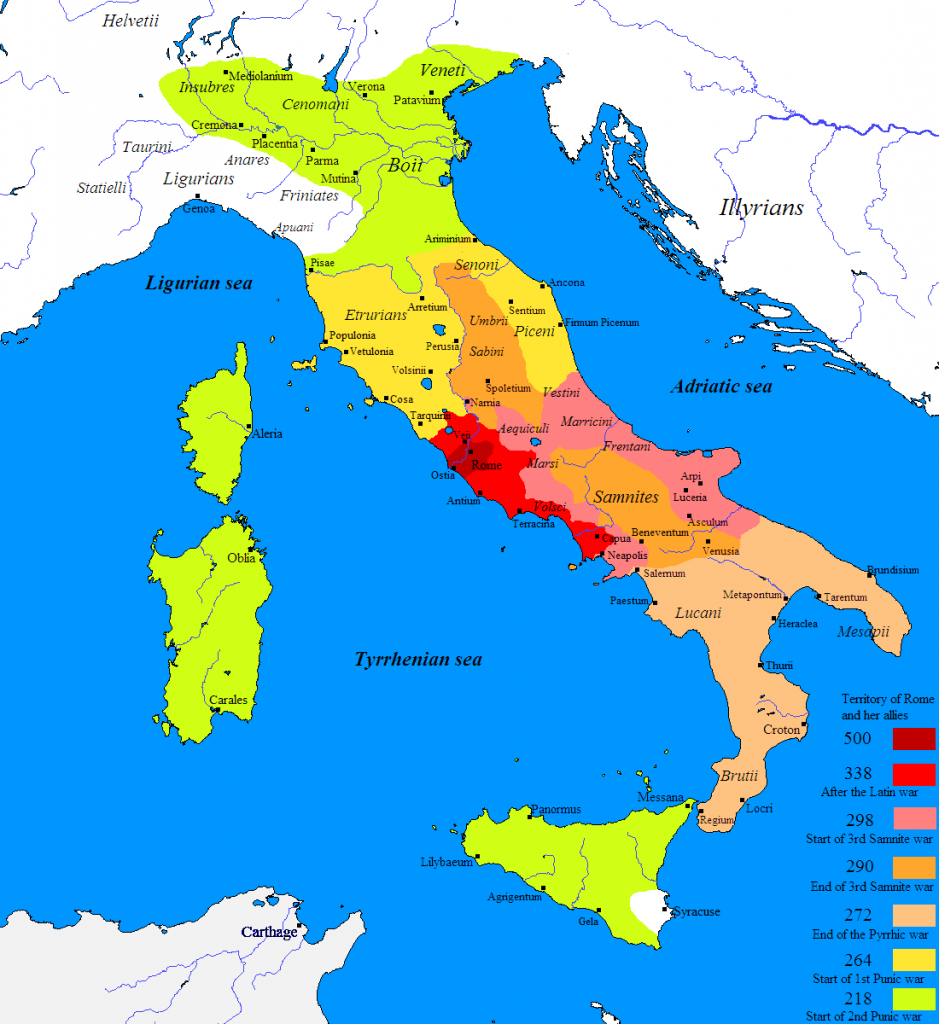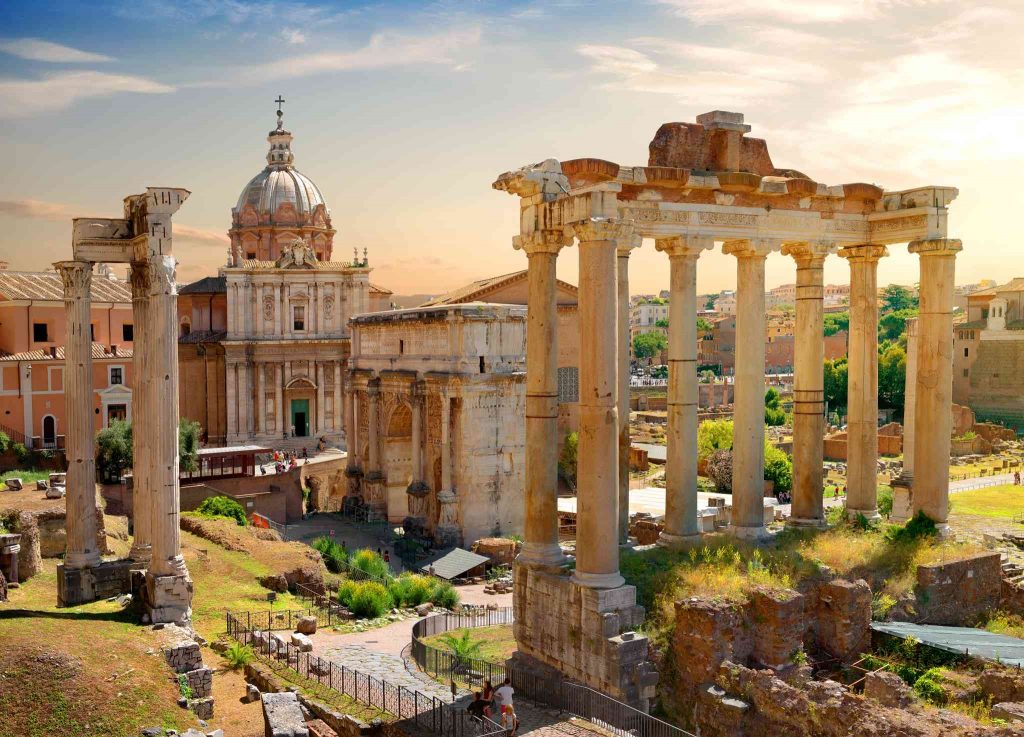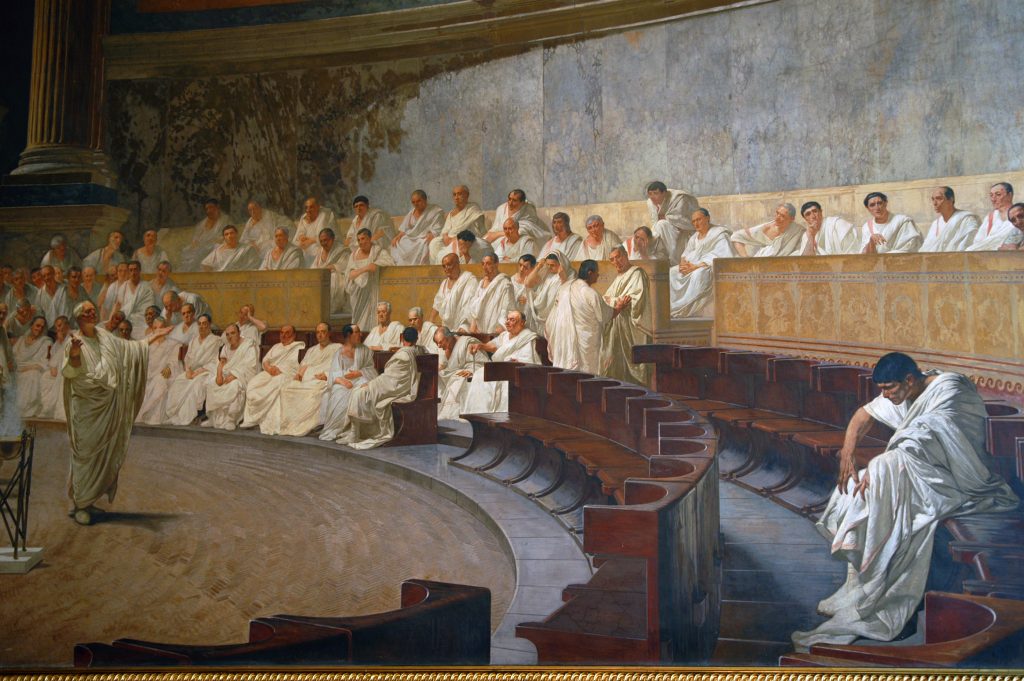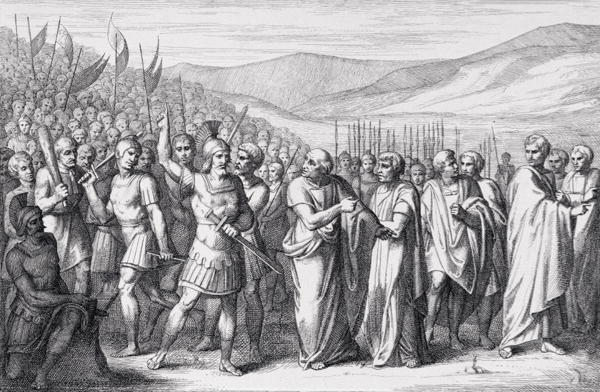Britain is currently undergoing an exceptional number of strike actions and industrial disputes, during a perilous time of economic uncertainty that has pushed many more households over the brink into poverty. A recent estimate puts the number of people living in poverty by 2023 at sixteen million. Knowing this, I thought I would take us back to what some say is the world’s first general rike. Secessio Plebis. I think this will allow us not only to visualise a momentous part of working class history, and avert our eyes from the problems of today, but also to see if we can learn from these actions and use them to inform us in current and future struggles.
Turning our gaze back over 2500 years to 495 BCE, and south, to the Italian Peninsula, we come across an up-and-coming city-state known as Romā or in English, Rome. This city was divided into a rigorous class system of Patricians (patres) and Plebeians (plebs), among others such as Equestrians and Slaves, who do not play a role in this story. The government was an oligarchy and was under the control of the patres. They were given the role of ‘senator’ by the semi-mythical king, Romulus, who used them as political advisors in his new city. However, when the monarchy was overthrown in 509 BCE, the Senate took control of all executive and legislative forms of government. This, unsurprisingly to any Marxist, allowed them to use the state power they had acquired to exploit the plebeian working class. A quote from Livy, our primary historian on the matter, says, “but the patres were too inconsiderate to the plebs, who began to feel their oppressive hand”. This caused discontent among the common people who, for context, had just witnessed the largest revolution in Roman history just 10 years prior. The revolution had promised democracy and an end to tyrannical rule, however as most past revolutions have shown, the new conditions allowed a new ruling class to rise and act only in their interest. In this case it was the aristocratic senators. Therefore the Senate forced the plebs into numerous wars of conquest that saw Rome’s borders spread, so the rich had more land to exploit and more persons to enslave.

The Senate also pushed the plebeians into economic hardship with loans that had rates so high they were unable to repay them. (This debt trap is what keeps many proletarians in the difficult position they find themselves in today.) At first, discontent could only be found in the dank taverns, where the Roman working-class drank away the toils of debts and labours. Though naturally, before long, murmurs grew to shouts and open conflict between the two classes became a serious concern; Livy says, “internal clashes between the patres and the plebs had burst into a blaze of hatred, chiefly on account of those who had been bound over to service for their debts.” However, unluckily for everyone involved, the Volscian tribes attacked Rome, and when the plebeians were sent out to defend against them, discontent grew ever more vigorous, due to them being away from the prying eyes of their Creditors-who had previously kept them under harsh conditions, and unsurprisingly felt little need to take up arms for the state with their fellow countrymen-now they could speak freely. Therefore, upon returning, a calamity struck which gave spark to an inferno of proletarian rage.
An old man, likely a veteran from Livy’s description, appeared in the Roman Forum, he was described by the historian as follows, “his dress was covered with filth, and the condition of his body was even worse, for he was pale and half dead with emaciation. Besides this, his straggling beard and hair had given a savage look to his countenance.” This man was a sight of horror for many in attendance as his war wounds were bare on his breast and his sorry circumstances clearly showed the people the conditions which they too could come to endure. What likely made their collective feelings of anger more potent is that the people realised that this man had been in fighting these wars for the sake of protecting the rich, and to be stabbed in the back in such an atrocious way was too heinous to overlook.
On a side note, Livy describes the crowd emphatically as “gathered about him much as though it were an assembly”. This is significant because it hints at something called a Plebeian Assembly which was, in essence, a gathering of commoners to pass legislation. Yet, such a council didn’t exist at the time, though it did to the non-contemporary historian. So it appears to be a literary hint at the growing class consciousness of the plebs, who in the next year would go on to have said Plebeian Assembly formalised in law as a result of the coming general strike.

To this ‘proto-assembly’ the old man told of his property being destroyed in a war with the Sabines and how, once he had lost everything, he was subject to usury, likely by a senator, though it is not mentioned explicitly. This garnered the ire of the crowd in attendance who immediately called for the senators to enact reforms that would ease their suffering. Unsurprisingly, the Senate had little interest in the affairs of the people, with one side of the house staunchly anti-reform and the other only considering reform so the plebs would return to the army and protect their estates from foreign attack. These two sides were each represented by a consul. The consuls were Appius Claudius Sabinus Regillensis on the hardliners’ side, and Publius Servilius Priscus Structus on the opposing one. Appius’s approach was as follows; “Appius, a headstrong man, was for settling the matter by the exercise of consular authority; when one or two men had been arrested, the others, he said, would calm down”, whereas Servilius’s approach was “more inclined to gentle measures, (he) believed that it was safer, as well as easier, to assuage their fury than to quell it”. The senators, however, were unconvinced by their leaders and so paralysis ensued, therefore Servilius took it upon himself to resolve the matter more informally.

Servilius announced the Senate’s stagnation to the people and said that the new threat of invasion from Volscian tribes meant the Senate now had more important business to attend to. To convince the lower classes to join the war effort (to protect patrician estates) Servilius claimed that the Senate would vote in their interest once the war was done. This promise led to mass enrolment in the military, described by Livy as follows, “the debtors who were present at once enlisted, and from every quarter, all over the city, they hastened from the houses where their creditors no longer had the right to detain them and rushed into the Forum to take the military oath. It was a great throng, nor were there any soldiers whose courage and usefulness in the Volscian war were more conspicuous.” This was a victory for the aristocracy, though after the war, the plebs came to realise that it had been a false promise and that Servilius was powerless and so could not un-paralyse the Senate. Therefore, no progress was made and the plebeians still toiled.
The next year saw new consuls elected – Aulus Verginius Tricostus Caeliomontanus and Titus Veturius Geminus Cicurinus. The plebs were unsure about the men’s characters and so continued their private meetings, now more formalised on the Esquiline and Aventine Hills of Rome. This led to more chaotic senatorial debates that eventually concluded that a dictator must be appointed. The job was given to Manius Valerius Maximus. The Dictator, however, was immediately called away to war, which was thankfully resolved in the same year of 494 BCE. Upon returning to Rome the Senate returned to inactivity, as they were still unwilling to sacrifice their profits and power to the labourers, and so stalled for time. The plebs were now sick of the posturing and, under the advice of a certain Lucius Sicinius Vellutus, walked out en masse to the ‘Sacred Mountain’, some three miles north of Rome. This became, in effect, a mass walkout, or neral strike, as all industry in Rome ceased, as well as all agricultural cultivation and military activity. The latter was the most serious, as Rome’s enemies were once again massing on the periphery of her territories, ready to pounce.
Livy conveys the situation as follows, “there, without any leader, they fortified their camp with stockade and trench, and continued quietly, taking nothing but what they required for their subsistence, for several days, neither receiving provocation nor giving any”. The leaderless situation led to paralysis in the organising of the strike, and therefore no actions were taken and the strikers were effectively waiting for the establishment to make the next move. The senators used the situation to their advantage and managed to secure mild reform which dampened any risk of revolutionary activity. They took, “steps towards harmony, and a compromise was effected on these terms: the plebeians were to have tribunes of their own, who should be sacrosanct, and in them should lie the right to aid the people against the consuls, nor should any senator be permitted to take this magistracy.” This allowed most political power to remain in the hands of the patres with only a minor portion of political power being granted to the plebs. Even more damning was the fact that successive centuries, before the rise of the emperors, saw the tribunes bribed onto the side of the patres and forsake their allegiance to their Plebeian class. This made them class traitors and showed the weakness of the reforms and the foolishness of the plebs who accepted such flimsy terms.
Sadly Livy breaks off here and the narrative moves onto a new topic. I have found this an unsatisfying ending, but there is a lesson to be learned. The strike is an example of what leaderless, spontaneous action can degenerate into. As Vladimir Lenin has taught us, the Vanguard of the working class must lead revolutionary activity and channel the class-conscious working people to overthrow their oppressors. This is an integral part of Marxism-Leninism.
Speculation on alternate histories is futile and not what this article is intending to do, but what should be heeded is that, during the industrial action of today, tomorrow and in the future, activists should strive to channel the ideas of the Vanguard Party. In my opinion, the Communist Party of Britain through their program, Britain’s Road to Socialism, offers us a fresh new path to the liberation of our modern proletariat and the construction of socialism in this country. I urge all of you to read it thoroughly and help to push its hypotheses into the world through revolutionary action. With every action we execute, we can bring ourselves closer to revolutionary change and not just the type of deficient reform accepted by our ancestors in this general strike.
Written by a member of YCL’s East of England and CPB Suffolk branches



